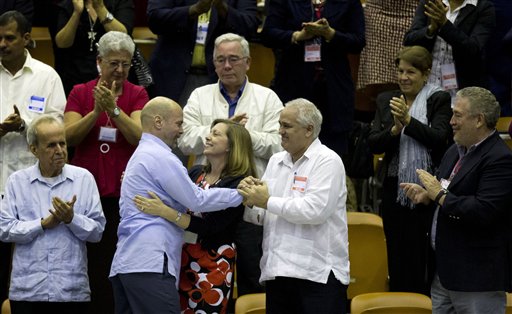Cuba signals that extradition of US fugitives off the table

In this Dec. 20, 2014, photo, Cuba’s head of North American affairs, Josefina Vidal, front row center, embraces Gerardo Hernandez, member of “The Cuban Five,” at the closing from a twice-annual legislative session at the National Assembly in Havana. AP
HAVANA—Cuba’s point person on US relations says anything is up for discussion as the two countries move to re-establish diplomatic ties, from anti-drug cooperation to joint environmental agreements.
But there’s at least one area where Cuba appears unwilling to budge: Asylum for fugitives whom the US has long sought to extradite from the communist-run country.
“Every nation has sovereign and legitimate rights to grant political asylum to people it considers to have been persecuted,” the Cuban Foreign Ministry’s head of North American affairs, Josefina Vidal, told The Associated Press.
“We’ve explained to the US government in the past that there are some people living in Cuba to whom Cuba has legitimately granted political asylum,” Vidal said, noting also that the two countries have no extradition treaty in effect.
Vidal’s comments in a Monday interview were the clearest sign yet that Cuba has no intention of extraditing America’s most-wanted woman, Joanne Chesimard, following a historic detente announced by last week by President Barack Obama and Raul Castro of Cuba.
Chesimard, who has changed her name to Assata Shakur, was granted asylum by Fidel Castro after she escaped from the prison where she was serving a sentence for killing a New Jersey state trooper in 1973 during a gunbattle after being stopped on the New Jersey Turnpike.
The first woman ever placed on the FBI’s most-wanted terrorist list was living so openly in Havana that her number was listed in the phone book.
New Jersey Governor Chris Christie has urged Obama to demand her return before restoring full relations.
In a letter to the White House made public Sunday, Christie called her asylum in Cuba “an affront to every resident of our state, our country, and in particular, the men and women of the New Jersey State Police, who have tirelessly tried to bring this killer back to justice.” The FBI and the New Jersey State Police have offered a $2 million reward for information leading to Shakur’s capture.
Later Monday, during an interview with a local television anchor, Christie responded to Vidal’s statement that Cuba has the right to grant political asylum to those who have been persecuted.
“So Joanne Chesimard, a cold-blooded cop-killer, convicted by a jury of her peers, in what is without question the fairest and most just criminal justice system in the world—certainly much more just than anything that’s happened in Cuba under the Castro brothers. She is now, according to an official of the Cuban government, persecuted,” he said.
He added, “these thugs in Cuba have given her political asylum for 30 years. It’s unacceptable.”
Bernadette Meehan, a spokeswoman for the White House’s National Security Council, said the Obama administration will “continue to press in our engagement with the Cuban government for the return of US fugitives in Cuba to pursue justice for the victims of their crimes.”
Several infamous convicts and suspects in high-profile American cases live openly in Cuba, as are others convicted of less serious crimes. Among these are a woman convicted of killing a police officer four decades ago, a man sought for a 31-year-old armed robbery, airplane hijackers and dozens of people accused of Medicare and insurance fraud.
Cuba occasionally returns people convicted or suspected of committing crimes in the US, but it doesn’t observe traditional extradition and refuses to send anyone back for a crime Havana considers political in nature, according to the State Department.
The Castro government’s frequent position on returning fugitives has been to ask for the US to return people wanted in Cuba.
“We’ve reminded the US government that in its country they’ve given shelter to dozens and dozens of Cuban citizens,” Vidal said. “Some of them accused of horrible crimes, some accused of terrorism, murder and kidnapping, and in every case the US government has decided to welcome them.”
In Cuba’s first detailed public response to Obama’s historic announcement last week, Vidal said Cuba is open to all of Obama’s moves to improve relations and strengthen private enterprise and civil society on the island. That includes US equipment to improve the Cuban Internet and US exports to Cuba’s new class of private business owners.
“Our president has said we welcome President Obama’s decision to introduce the most significant changes in relations with Cuba in 54 years,” Vidal said. “That includes the entire package.”
Cuba has historically imposed heavy regulations on the Internet and private business as it has blamed the US embargo for the problems of the island’s stagnant economy.
Vidal said an economic opening by the US would be an opportunity to show what the country can do unshackled.
Obama’s announcement included a very general list of reforms and left a series of open questions about how far the US could go to create deeper economic ties with Cuba. Details are expected in the coming weeks.
Vidal said Cuba would only know how it would manage its end of the new relationship once the American government plan was clearer.
“We have to see how we are going to implement things,” she said.
RELATED STORIES
Pope played crucial role in US-Cuba rapprochement
No word yet from Fidel amid historic US-Cuba shift